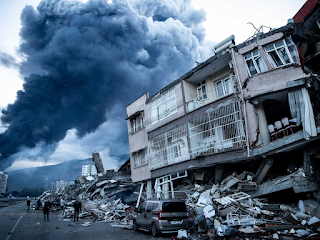Earthquakes are one of the most powerful and devastating natural disasters that can
strike our planet. They occur when tectonic plates beneath the earth's surface suddenly shift and release energy, causing the ground to shake and potentially causing destruction to structures and infrastructure. Earthquakes have been recorded throughout history, and their impact can be felt on a global scale, both in terms of the physical damage they cause and the psychological trauma that can result from experiencing their effects.Earthquakes have the power to cause widespread damage and loss of life. They can
trigger landslides, tsunamis, fires, and even volcanic eruptions, all of which can contribute to the destruction and loss of property and human life. Earthquakes also have a broader impact on the environment, disrupting ecosystems and causing damage to critical infrastructure like water and power lines.Despite the danger they pose, Earthquakes are incredibly difficult to predict, and we
currently have limited technology for detecting and monitoring them. Because of this, it's important to have solid earthquake preparedness plans in place. This includes ensuring that buildings are constructed to withstand seismic activity, making sure there are strong early warning systems in place, and having supplies and emergency procedures established in case of a quake.In conclusion, Earthquakes are one of the most powerful and significant natural
disasters that we face as a planet. While we have made progress in preparing for and mitigating their impact, there is still much work to be done in understanding and predicting their occurrence. With continued research and planning, we can hopefully decrease the damage they cause and protect the lives and property of those who are affected by them.





No comments:
Post a Comment